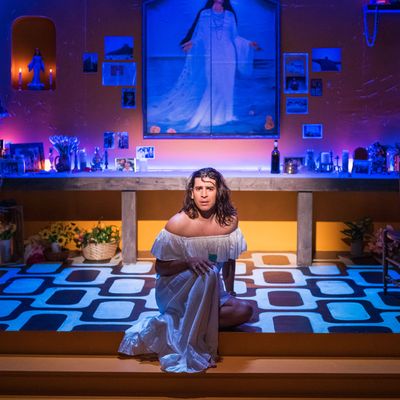
When Arturo Luís Soria enters to perform his solo show Ni Mi Madre, he seems to be walking into church. The Rattlestick Theater’s stage is arranged as a lush, fantastical altar — the walls glow orange, while piles of fruit and plants and candles bracket an altarpiece of the Virgin Mary. Or is it Our Lady? The dark-haired woman in the painting is wearing a diaphanous blue robe, wafting across an Ipanema beach. At various points in the show, she is clearly Iemanjá, the Afro-Brazilian goddess of the ocean. But just as Soria walks somberly onstage carrying a votive offering, another likeness clicks: This madonna also looks a little like … Cher?
In the packed 60-minute show, Soria plays Bete (pronounced Betchi), a lightly fictionalized version of his own mother. As Bete, Soria’s drag is understated — his hair swings loose around his face, and he wears a flounced white dress, baring his shoulders. After exploding the introductory religious mood with a hair-flip, Bete sings (inaccurately) along to “Believe (in Life After Love),” then launches into a mile-a-minute monologue. In its way, the play is a tribute to all the Great Mothers: Iemanjá, Soria’s own mother, Cherilyn Sarkisian. Is he making fun? Is he paying homage? Yes and yes.
Soria was a scene-stealer in The Inheritance on Broadway, but in a solo performance, what can he do — steal scenes from himself? Though he is alone onstage, his mother’s spirit is powerful — and she does actually seem to fight him a little, even from within. Bete is a firecracker, a pistol, a bazooka, a volcano. She starts by telling the audience she’s had plastic surgery, paid for “with his money” (“I’m gonna build an enterprise: WHM, Incorporated!”), recommends that the ladies give up underwear to “let the mamita breathe,” and lampoons her husband for underservicing her — all in her first breath. Bete rattles from English to Portuguese to Spanish, faster than she rattles from hilarious complaints about her three husbands to troubling complaints about her kids. She seems to want to possess them forever, to make them part of her body. This one is the apple of her eye, that one is her right hand. Arturo, she says, “is my heart. But hearts break.”
Soria constructs the performance as a series of mirrors, or a mise en abyme: Though he is only one performer, he reflects his mother, who reflects him, who reflects her, and so on. (At one point, the altarpiece swings open to show three mirrors inside: It was a vanity all along.) There’s deep affection between Bete and her son, but when Arturo left the family, he never went back. Bete supports her son’s queerness — “When he came out it was gaygaygaygaygay, poof, glitter” — but not of the way he has separated himself from her. After she’s charmed us with shocking candor and irrepressible humor, she tells tales from Arturo’s childhood in which she seems violent and controlling. The more Bete describes her relationship with her son, the more she reveals about her own mother, who sent her away multiple times. Was she unloved? Certainly her Brazilian mother felt it keenly that Bete had light skin while she was dark. Colorism and resentment move as deep currents in the family: Bete’s first wonderful jokes about plastic surgery might reemerge suddenly in your memory, reminders of how deep one’s own skin-hatred can go.
This first pandemic-era in-person show at the Rattlestick gleams with polish. The show’s director Danilo Gambini (a talented Brazilian director with a history of opera productions) and set designer Stephanie Osin Cohen started working with Soria when they were graduate students at Yale together. Soria’s work on his project goes back even farther — he’s been writing it since he was in his early 20s. Thirteen years of rewriting and rehearsing have left him with a script that shines like lacquer, and an impersonation that’s kinetically exquisite.
It’s an odd kind of ritual: imitating your own mother talking about you, then performing it for an audience. But there’s clearly something therapeutic here, a laughing resignation about Bete’s bigger-than-life character that has turned, over time, into a deeper forgiveness and understanding. At a post-show discussion, Soria mentioned the many elements that have been cut over the years (at one point the character was in a coma because his mother was in a coma), and you can still sense those missing scenes, moving below the surface. And indeed, as delightful as Ni Mi Madre is for those watching, for Soria it seems to serve some deeper purpose. At the end of the show, he returns to the image of an offering to Iemanjá, who accepts votives launched in small boats on the waves. Imagining himself standing in the surf, Soria pictures Bete accepting and forgiving her mother, as Soria accepts and forgives her. But don’t things pushed into the ocean … return? The show is at the Rattlestick Theater until September 19, but I have a feeling Soria might not be free of this production so easily. Once you start, how can you ever come to the end of describing your mother? It would be like coming to the end of the tide.
Ni Mi Madre is at the Rattlestick Playwrights Theater through September 25.


